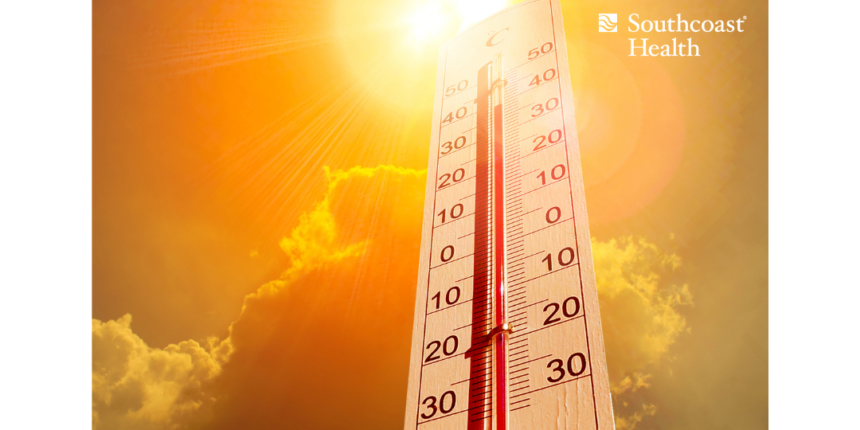Health Tips
Summer Wellness: Avoiding Heat Illness

Summer in coastal New England means beach trips, vacations, and family fun. But be mindful that exposure to prolonged periods of heat and humidity without relief or adequate fluid intake can cause serious heat-related illnesses, either from over-exertion outdoors without drinking adequate fluids or being confined indoors in a hot environment.
Heat Cramps— The mildest form of heat illness consists of painful muscle cramps and spasms that occur during or after intense exercise and sweating in high heat.
Symptoms: Painful cramps, especially in the legs; flushed, moist skin.
What to do: Move to a cool place and rest; remove excess clothing and place cool cloths on the skin; fan the skin and drink cool sports drinks containing salt and sugar; stretch cramped muscles slowly and gently.
Heat Exhaustion— More severe than heat cramps, heat exhaustion results from a loss of water and salt in the body. It occurs in conditions of extreme heat and excessive sweating without adequate fluid and salt replacement. Heat exhaustion occurs when the body is unable to cool itself properly and, if left untreated, can progress to heat stroke.
Symptoms: Muscle cramps, pale, moist skin, fever (over 100.4° F or 34° C), nausea, and vomiting, diarrhea, headache, fatigue, weakness, anxiety, light-headedness
What to do: Move to a cool place and rest, remove excess clothing and place cool cloths on skin, drink cool sports drinks containing salt and sugar. If there is no improvement or the patient is unable to take fluids, go to the hospital emergency department immediately.
Heat Stroke — The most severe form of heat illness occurs when the body’s heat-regulating system is overwhelmed by excessive heat. It is a life-threatening emergency that requires immediate medical attention.
Symptoms: Warm, dry skin, high fever (usually over 104° F (or 40° C), rapid heart rate, loss of appetite, nausea and vomiting, headache, fatigue, confusion, agitation, lethargy, stupor, seizures.
What to do: Call 911 becauseheat stroke is life-threatening and can lead to coma or death. Move to a cool place and rest, remove excess clothing and drench skin with cool water and fan skin; remove excess clothing and drench skin with cool water; place ice bags on the armpits and groin, if alert and able to swallow, drink cool fluids.
Preventing heat-related illness:
- Don’t leave children (or pets) unattended in a car – even if the windows are cracked open.
- Drink plenty of fluids during vigorous or outdoor activities (including sunbathing), especially on hot days. Drink water and sports drinks and avoid alcohol or fluids with caffeine, such as tea, coffee, and cola as they can lead to dehydration.
- Wear light-colored, lightweight, tightly woven, loose-fitting clothing on hot days.
- Schedule vigorous activity and sports for cooler times of the day. Take rest periods in shady or cool areas.
- Wear a hat and sunglasses, use an umbrella for shade, use sunscreen of at least SPF 15.
- Take frequent drink breaks and “wet down” or “mist” with a spray bottle.
- Stay indoors on especially hot and humid days.
- Remember to warm up and cool down before and after exercising.
- If exercising, take frequent breaks for water or sports drinks. Drink about 1 cup of fluid every 15 minutes of exercise.
When to get help: Call 911 or immediately go to the hospital emergency department if you or someone else has been in the heat and experiences confusion, faintness, staggering, hallucinations, unusual agitation, or coma.
For a helpful guide on how to get the right care for any injury or health problem, visit Know Where to Go.
